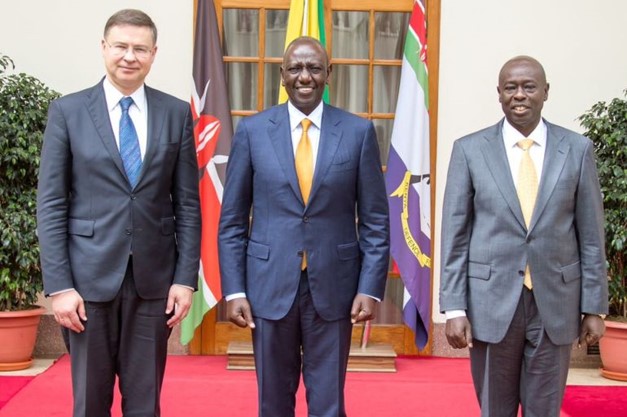Kenya-EU trade pact to come into force ‘in 2-3 months’
Post By Diaspoint | March 4, 2024

The European Union (EU) Parliament on Thursday endorsed the EU-Kenya trade pact, paving the way for quota-free and duty-free market access.
The deal now goes to the Kenya National Assembly for ratification.
The Ministry of Trade will then conduct public awareness on the Kenya-EU Economic Partnership Agreement (Epa) and its implications.
Cabinet Secretary for Investments, Trade and Industry Rebecca Miano said after parliament ratifies the pact, it will come into force in “two to three months.”
“My ministry is preparing to conduct public awareness and disseminate information on the EPA as soon as it is ratified,” she told The EastAfrican.
Related
A statement from Kenya’s President William Ruto’s spokesman Hussein Mohamed said the EPA will ensure farmers, processors and traders enjoy duty-free and quota-free access for Kenyan exports, including flowers, tea, coffee, fish, vegetables, fruits and nuts.
It is also expected to open up significant opportunities for Europe in trade and investment in Kenya, especially in the manufacturing of chemicals, steel, pharmaceuticals and machinery.
The main objective of the EPA is to liberalise trade between the EU and Kenya.
The EU’s imports from Kenya amount to $1.3 billion and are mainly vegetables, fruits, and flowers.
EU’s exports to Kenya amount to $2.18 billion and are mainly in mineral and chemical products and in machinery.
As in other EPAs, the EU-Kenya deal involves an asymmetrical removal of tariffs. In practical terms, the EU fully liberalises access to its market upon application of the EPA and all goods from Kenya (except arms) can enter its market without tariffs or quotas.
Once in force, Kenya will open up its market gradually to imports from the EU, benefiting from transition periods. It will exclude sensitive products from liberalisation.
Kenya may also benefit from other provisions that consider its development needs such as special safeguards for agriculture, measures on food security and infant industry protection.
The deal has a comprehensive chapter on trade and sustainable development (TSD) reflecting a high level of ambition. It incorporates most of the outcome of the EU’s TSD review.
The agreement includes strong and binding provisions on labour standards, climate change and biodiversity, and gender equality.
Read More from original source
